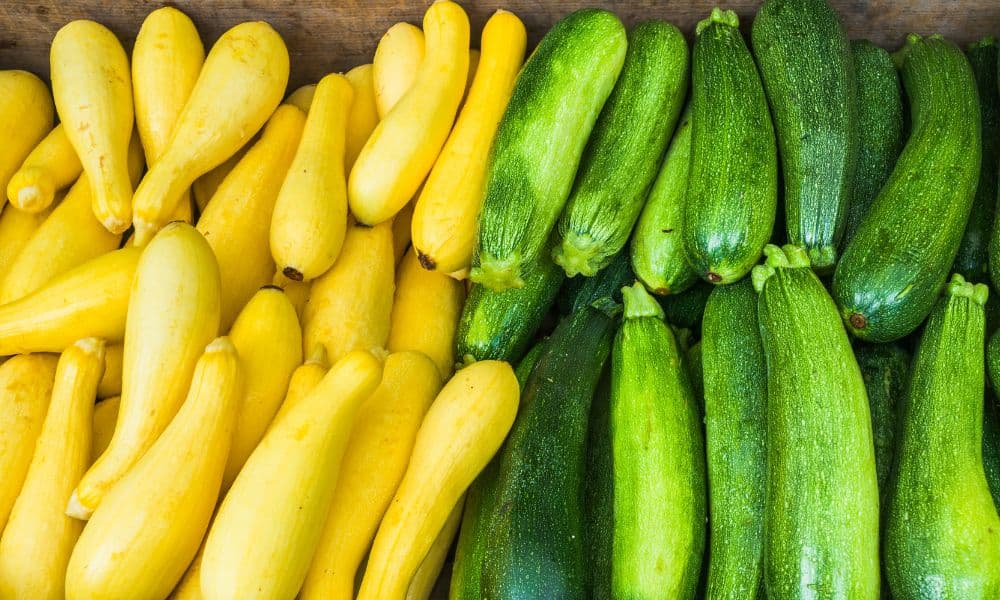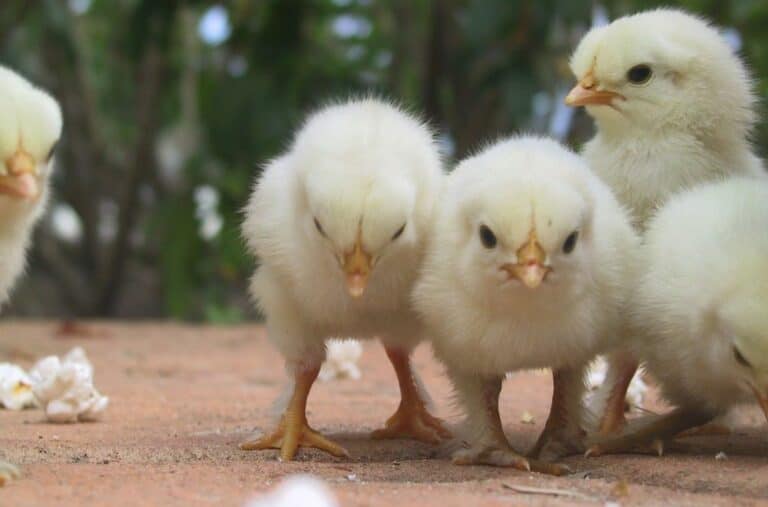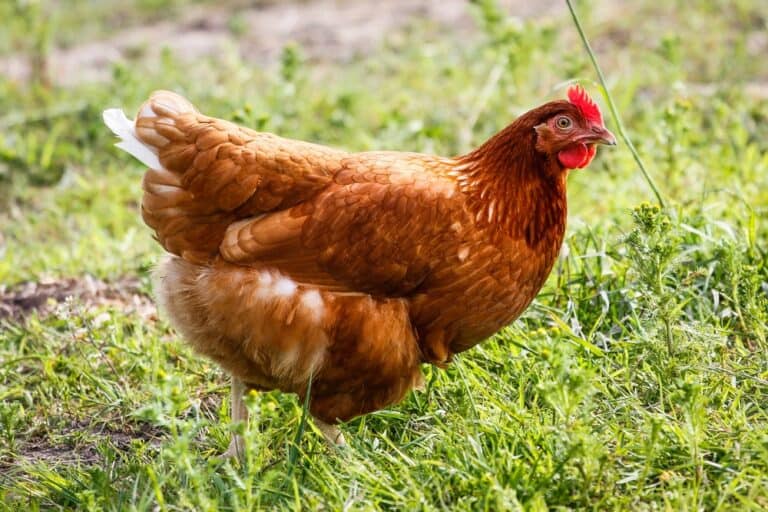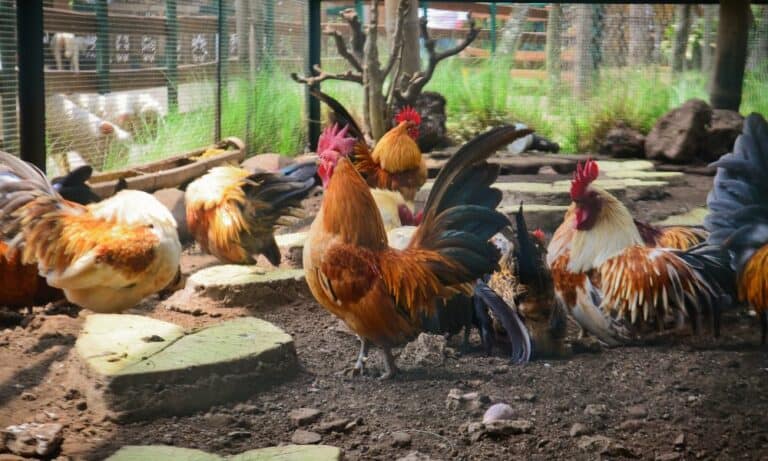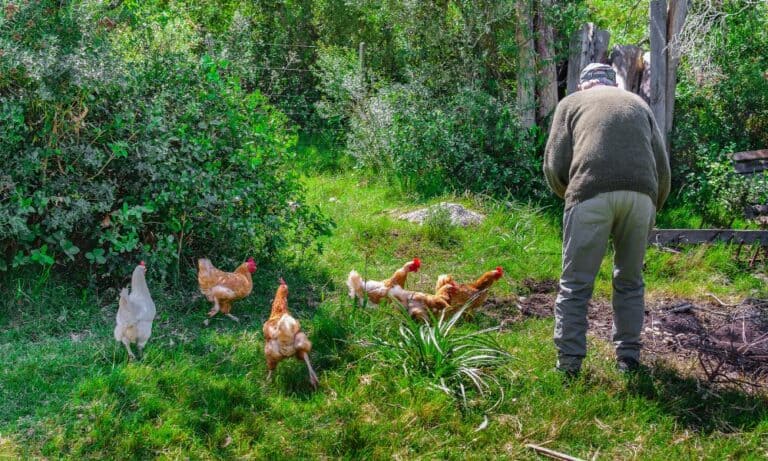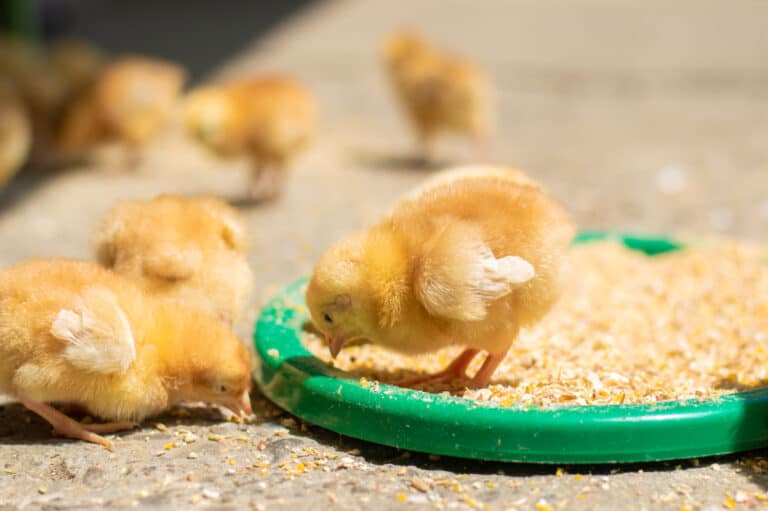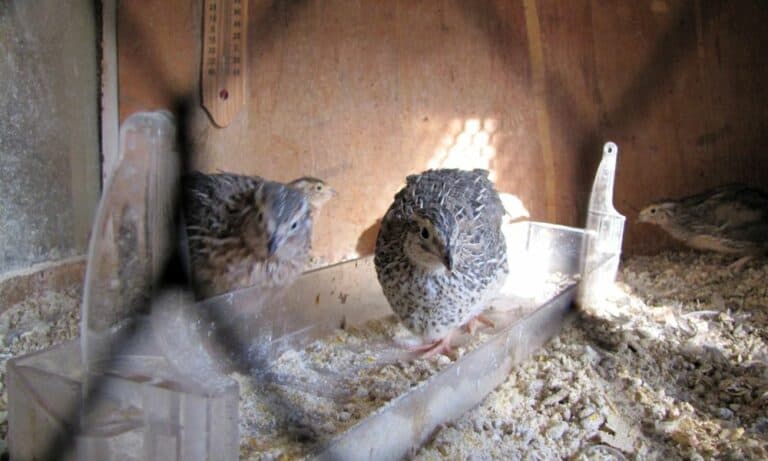As most chicken keepers will know, chickens are happy to eat just about anything that comes their way, and many foods that we eat can also safely be fed to chickens to help give them a more varied diet while also providing them with valuable extra nutrients.
However, some foods are dangerous for chickens and shouldn’t be fed to them, so if you have squashes growing in your garden, you’re probably wondering if they’re ok for your birds. And to give you the answer, in this post, we discuss the question, can chickens eat squash?
Can Chickens Eat Squash? The short answer

Before we talk about this question in depth, let’s start with a short answer.
Can chickens eat squash? Yes, they can! They can eat all kinds of edible squash, both summer and winter varieties, most chickens seem to love them – and they’re packed full of all kinds of nutrients, vitamins and minerals that will help keep your chickens healthy and productive.
So if you’re looking for a tasty treat for your chickens and have some extra squashes growing in your garden – or maybe if you just have some left over from a meal you made – you can hand them over to your chickens to deal with because they’re sure to love them.
There’s a bit more to feeding squash to chickens than just this though, so now let’s have a look at the topic in a bit more detail.
What is a squash?
Let’s start with the basics – what is a squash?
Squashes are plants belonging to the Cucurbita genus that produce large, often edible fruit. They are native to the Andes and Mesoamerica where they were domesticated many thousands of years ago.
They can be divided into two main groups, the winter squashes and the summer squashes, depending on when the fruit is harvested.
Summer squashes are harvested in summer when the fruit is still immature and include zucchini, pattypan squash, crookneck squash and straightneck squash.
Winter squashes, on the other hand, are harvested when mature. They include the acorn squash, the butternut squash and various types of pumpkin. Marrows are the mature version of zucchini and are considered a type of winter squash.
Although the part we usually eat is technically a fruit, it is usually treated as a vegetable for cooking.
Non-domesticated and ornamental squashes also exist, but these can’t be eaten since they contain high levels of cucurbitacin, which is poisonous to humans, chickens and many other animals.
Can chickens eat all kinds of squash?
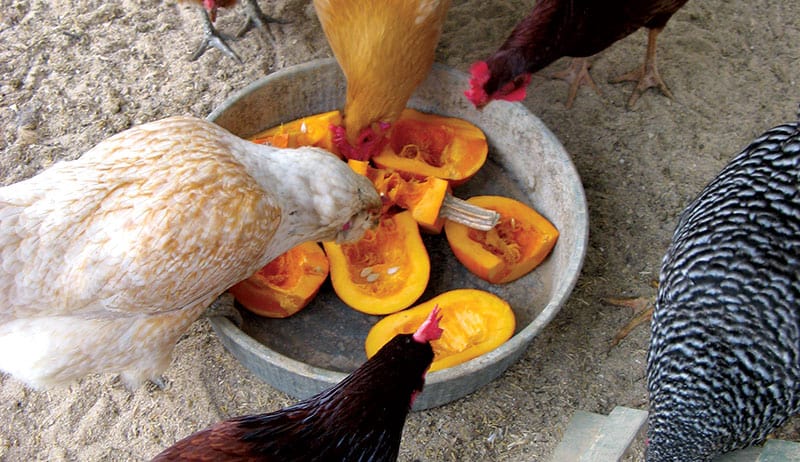
Chickens can eat all types of edible squash, including both summer squashes like zucchini and winter squashes like pumpkins.
The only ones they can’t eat are the non-edible varieties, including wild squashes and ornamental squashes.
Furthermore, chickens can also eat the other parts of the edible squash plants, including the leaves and the vines, so if you have them growing, you can save these parts for your chickens when you are tidying up your garden.
Are squashes good for chickens?
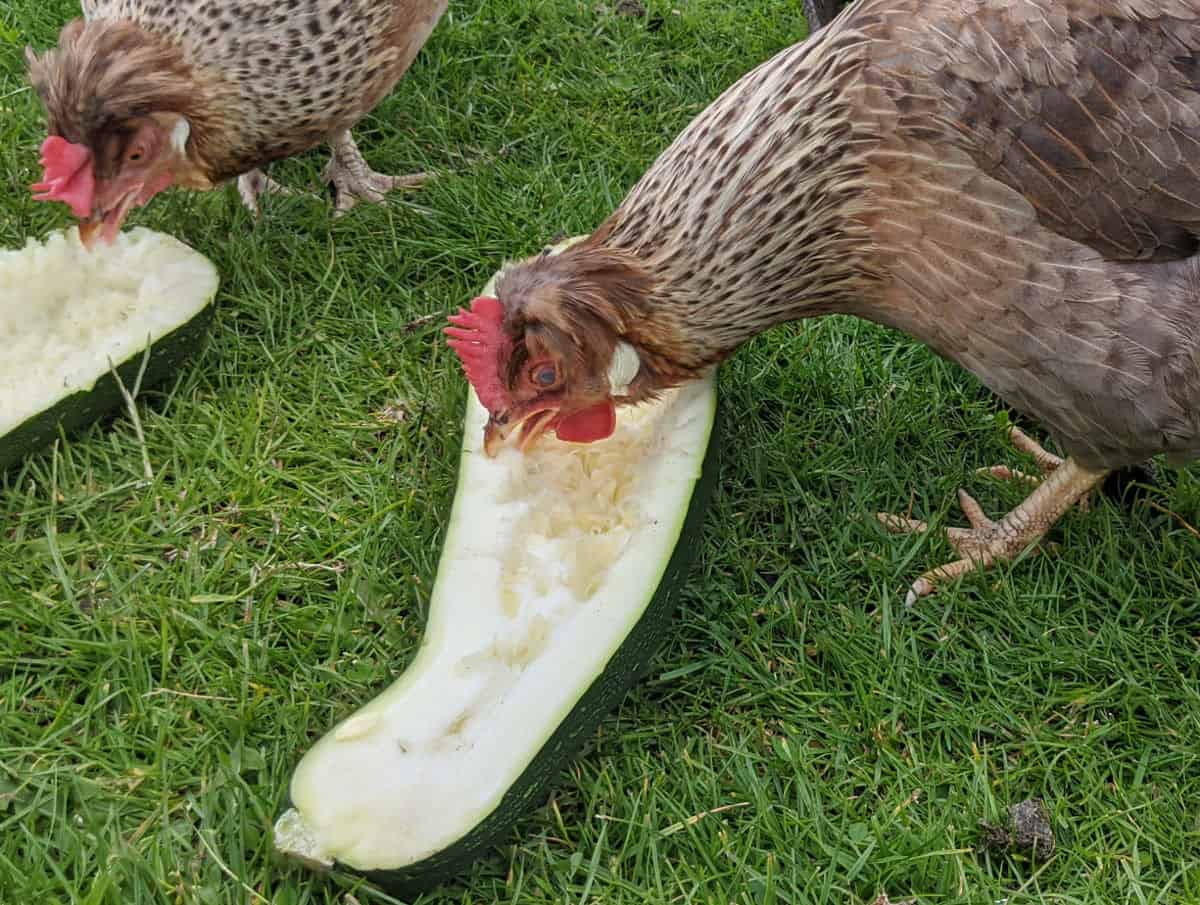
We’ve established that chickens can eat squashes, and we’ve also mentioned that they are full of beneficial nutrients – so let’s have a look at this in a bit more detail now.
Although the exact nutritional profile of a squash depends on which type it is, members of the squash family all contain a similar suite of nutrients, vitamins and minerals.
They are rich in vitamin C and are also good sources of vitamins B2 and B6 while also containing lower levels of several other vitamins.
Squashes are good sources of several important minerals, including manganese and potassium. They also contain some magnesium and phosphorous as well as a lower amount of iron.
In addition, they also provide a certain amount of dietary fiber, which is important for maintaining gut health and keeping the digestive system in good working order.
Furthermore, the seeds of squashes contain small amounts of curcubitin, a type of amino acid that retards the development of parasitic flukes, which makes the seeds of squashes effective natural dewormers.
So in short, not only are squashes delicious treats that chickens love eating, but they are also extremely beneficial to chickens’ health and can play an important role in keeping your chickens healthy and productive.
Is there anything to be careful about?
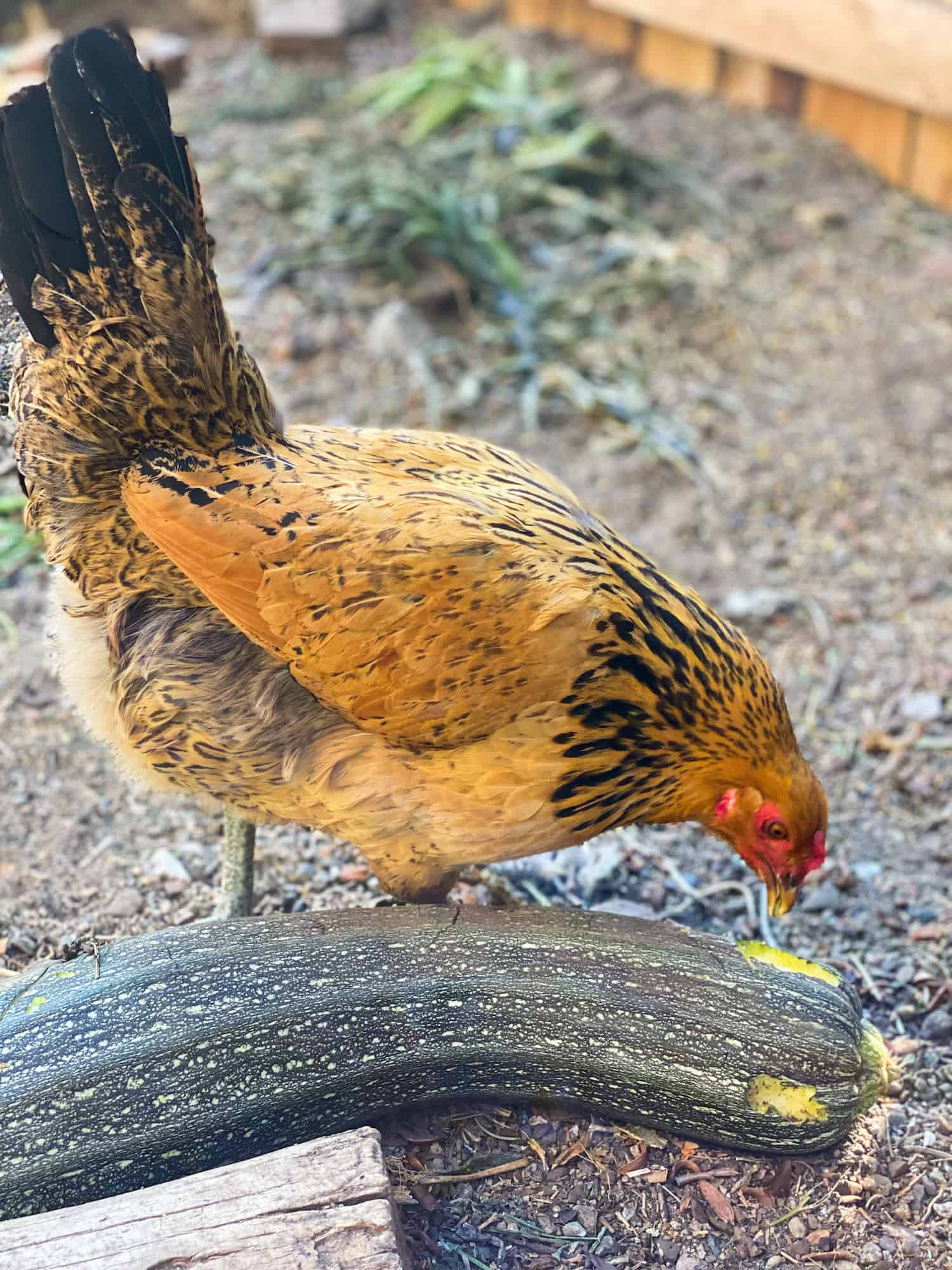
Generally speaking, chickens can eat most types of squashes, both raw and cooked, but there are a couple of things you need to be aware of when feeding squashes to your birds.
First, you should only feed chickens the kinds of squashes we eat – if it’s not safe for human consumption, it’s not safe for chickens either.
Second, you should be careful if you grow edible and non-edible squashes together since cross-pollination is possible, and if your ornamental squashes manage to cross with the squashes you grow for food, the resulting fruit may be poisonous.
Similarly, if you harvest the seeds from edible squashes and try to plant them, the resulting fruit may revert to forms closer to the wild versions, which may mean the cucurbitacin levels are too high for them to be eaten.
Underwatering or irregular watering may also lead to an increase in cucurbitacin levels, even in plants that usually produce edible fruit.
Finally, if you buy squashes from a grocery store, always opt for organic ones since they will be free of pesticides that may be harmful to your chickens. If not, make sure you wash them thoroughly before feeding them to your birds to avoid a build-up of pesticides in their tissues.
How to feed squashes to chickens
How you feed squashes to chickens depends largely on what type of squash you have, but here are a few ideas for how to feed them to your chickens.
1. Small, soft summer squashes
If you have something small and soft like zucchini, you can simply hand them over whole and uncooked and let the chickens peck at them. There’s nothing in a zucchini a chicken can’t eat, and their beaks are perfectly strong enough to deal with the skin of a zucchini.
Indeed, the skins are even more packed with nutritional goodness than the flesh, so if you peel them, you’ll be depriving your chickens of some of the benefits of the zucchini.
2. Larger, harder squashes
If the squash you have is something larger and harder like a pumpkin, chickens won’t be able to peck through the outer skin, so they will probably just end up ignoring it if you give it to them whole.
Instead, it’s a good idea to cut a pumpkin into halves or even quarters and then let the chickens peck at the fleshy part inside.
Also, most chickens won’t enjoy the slimy, stringy part in the middle that some people call the “guts” of the squash. This means your chickens might prefer it if you remove this part first.
At the same time, you should try to leave the seeds in because those are beneficial to chickens’ health, so it’s better if they eat them.
3. Cooking squash for chickens
You can also feed chickens cooked squash, although make sure you don’t cook it with salt. And of course, if you want to feed chickens scraps from your plate, make sure you don’t season it with salt first because salt is bad for chickens, so you should minimize how much they eat.
4. Chop and mix with other food
Another idea is to chop up squash – either cooked or raw – and mix it with other fruit or vegetables or mix it with your chickens’ regular feed to give them a bit more variety in their diet.
Don’t give them too much
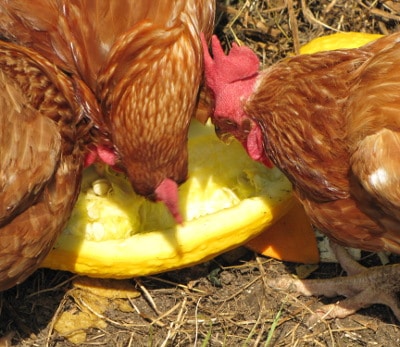
However you decide to feed squash to your chickens, the most important thing to remember is never to give them too much – so how much should you give them?
Chickens have very specific dietary requirements, and if these requirements are not met, they may become undernourished, their health may suffer and their egg-laying productivity is likely to decrease.
This is why commercial chicken feed is specially formulated to meet all their nutritional needs, but if you feed them too many treats, they may start neglecting their regular feed in favor of the treats, and as a result, they will start to miss out on some essential nutrients.
To avoid this, always follow the 10% rule of never allowing treats to exceed 10% of their overall diet. The other 90% should come from their regular feed – and healthy treats can then supplement this, which will ensure they always receive all the nutrients they need.
This means squashes should be seen as treats and not as their staple food – and squashes combined with any other treats should never make up more than 10% of what chickens eat.
In practice, this means giving them a few pieces of squash every two or three days at most will allow them to benefit from all the goodness squashes contain without affecting how much of their regular feed they consume.
A great treat for chickens – in moderation
So as we’ve seen, squashes ok for chickens to eat, but more than this, they’re also a nutritious treat that they’re sure to love.
As always with feeding treats to chickens, only give them squashes in moderation – however, as long as you stick to the 10% rule, squashes can make an important contribution to giving your birds a balanced and healthy diet.

